MDI Data & Reports
The five dimensions included on the Middle Years Development Instrument (MDI) provide information on a broad range of children’s social and emotional development, well-being, health, and experiences at school, at home, and in the community. The data collected from the MDI questionnaire are presented in reports with easy-to-understand visualizations and infographics, showing detailed information for the whole community.

Current information & patterns over time
MDI reports are designed to build an understanding of the most current information on children’s well-being and assets in your region and provide an opportunity to identify patterns and variations over time. MDI data is not reported for individual students.


A tool for sharing
MDI reports are also a powerful tool for gathering partners to discuss children’s well-being across multiple contexts (for example, schools, home, and community) and for catalyzing action to support children’s assets and well-being.

Well-supported report releases
Each year, when MDI reports are released, HELP staff offer free, public webinars that are designed to provide strategies and examples of the ways in which MDI data can be used to support planning for children’s well-being in classrooms, schools, and communities. You can watch past webinars here. In addition, Discover MDI is designed to support your efforts to use MDI data to encourage positive change.

Accessing Data for First Nations, Inuit, and Métis Children
One of our goals at the Human Early Learning Partnership (HELP) is to ensure that our tools and approaches are culturally-safe and appropriate, embracing the principles of OCAP® – Ownership, Control, Access and Possession and the Five Safes’ Framework that govern data collection, storage and reporting. When reported and shared in a culturally-safe manner, MDI data gathered from First Nations, Inuit, and Métis children can support dialogue and planning and contribute to ongoing community initiatives.
HELP has guidelines for the release of data for Indigenous children. This ensures data are accessible to, and meet the needs of, various Indigenous governance groups and community organizations. Under the guidance of the Aboriginal Steering Committee (ASC) at HELP, we have established a protocol regarding the sharing and reporting of disaggregated, data for First Nations, Inuit, and Métis children.
To learn more about data request and access protocols please contact Kinwa Bluesky, Senior Manager, Indigenous Initiatives. HELP staff are available to navigate the data request process and to provide ongoing support in using and understanding MDI data.
“The MDI is our children’s voices, telling us what is working for them and what isn’t working for them. The MDI really helps us pay attention to what children are saying.”
– Connie Deane, North Okanagan Friendship Center
MDI Report Types
The types of reports available to you vary by school system, province, and territory. Please check with your local MDI Lead to see which reports are available in your area. For all reports described below, information on individual children and their answers are not reported and neither individual children nor their answers are identifiable. The MDI Companion Guide provides more detail on the data in the reports.
Reports for the School System
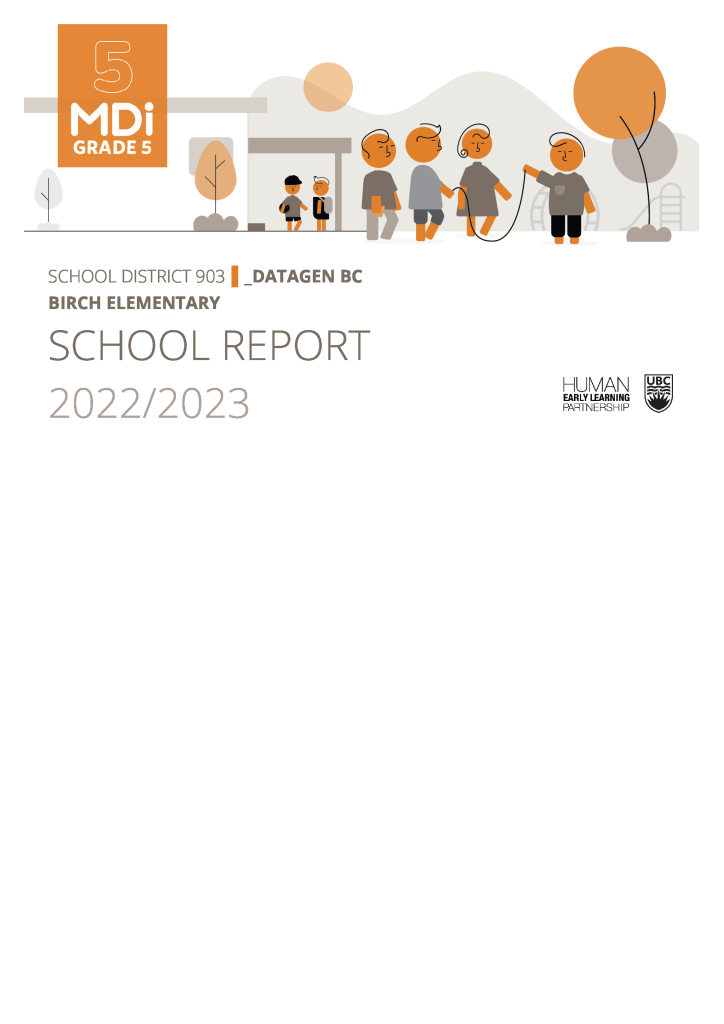
MDI School Reports (Privately Accesssed)
Available to participating school systems in all provinces & territories
MDI School Reports provide data, aggregated by grade level, for children in Grades 4 through 8 who completed the MDI at participating schools. When there are fewer than five children represented in the school, a school report is not produced. Separate reports are produced for each grade that the school participated in and these reports are available to school district superintendents and MDI Leads (the staff member leading the MDI project for the school system) via the MDI e-System—our online portal for administrating the MDI and accessing reports.
Superintendents and MDI Leads are encouraged to share school-level reports with school administrators and staff, as well as parents, children, and others in the community. Because of concerns of ranking schools based on their MDI results, the Human Early Learning Partnership (HELP) does not publicly release individual school reports.
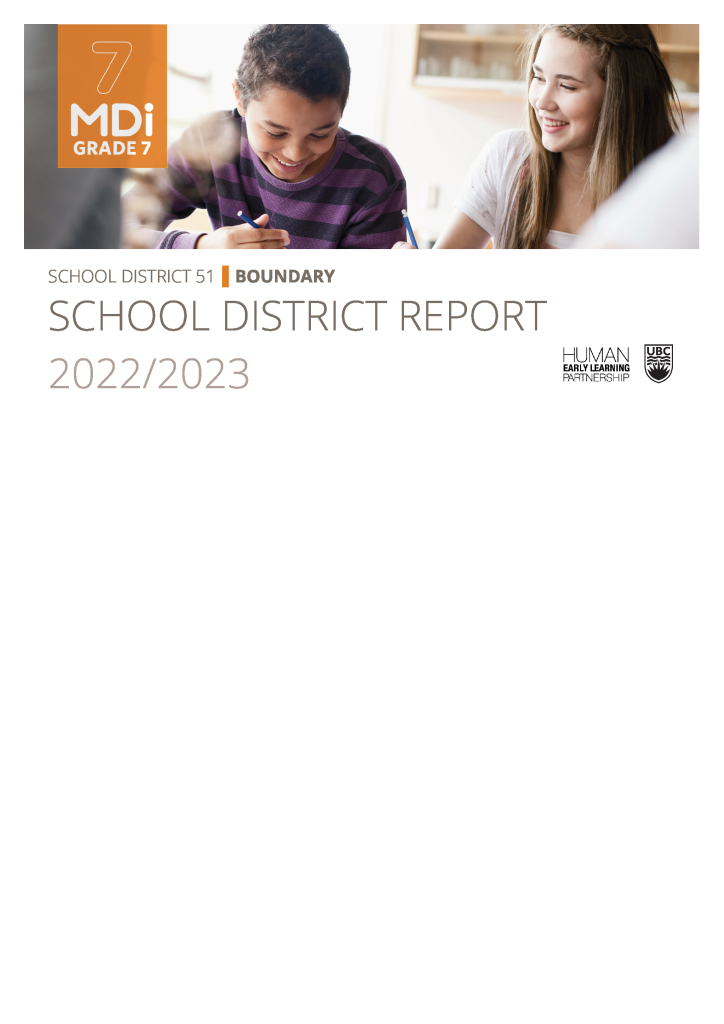
MDI School District Reports (Privately & Publicly Accessed)
Available in participating school systems in all provinces & territories
MDI School District Reports provide a comprehensive picture of the social and emotional development, well-being, health, and experiences at school, at home, and in the community of a population of children attending school within a specific school system. These reports combine data into summaries for each school system: one report for each grade that participated and for which data were collected.
If you are an administrator or educator in a participating school system outside of BC, you can access your online School District Report(s) by logging in to the MDI e-System.
MDI School District Reports for all participating BC school districts are publicly available on the Human Early Learning Partnership website. The reports are may be accessed by clicking the button below and then selecting the school district of interest.
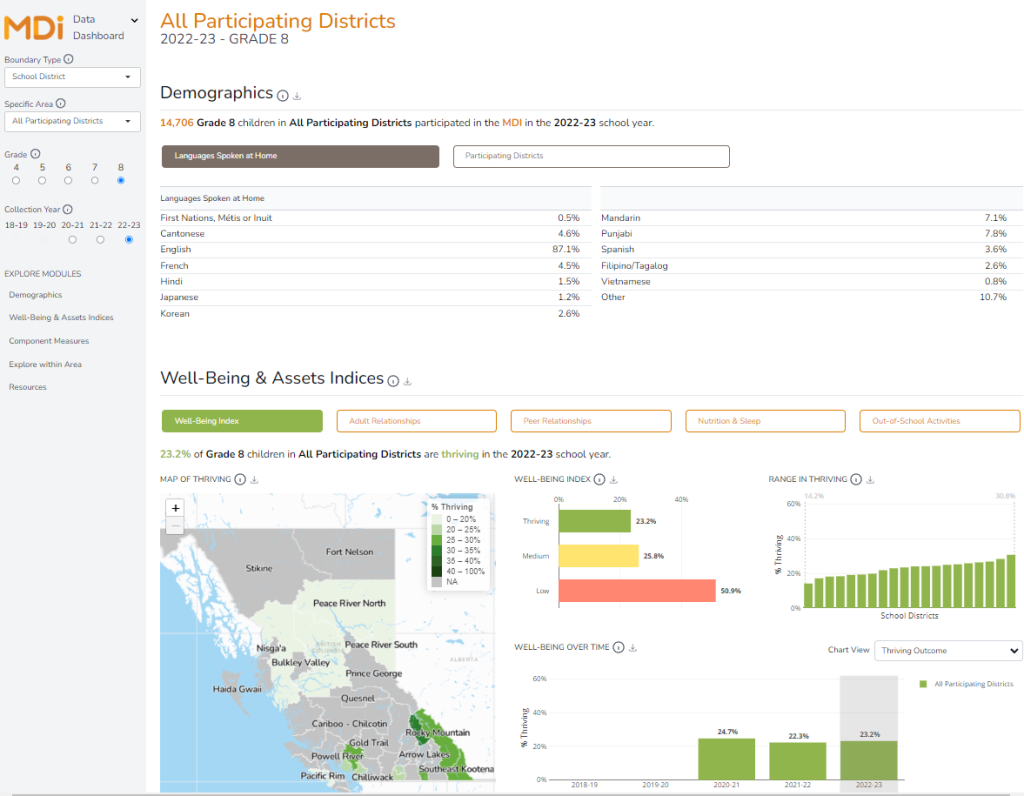
MDI Data Dashboard (BC only)
Includes data from participating British Columbia schools (2018/19 to current)
Prior to the 2022/23 reporting year, the BC public MDI reports combined school district data with community-level data. These reports were known as the MDI School District & Community Reports and included maps and neighbourhood profiles. In 2023, HELP launched the MDI Data Dashboard, a new reporting tool for exploring MDI data from participating BC school districts over the past five years. The Dashboard replaces the maps and neighbourhood profiles section of the public BC MDI reports. With the Dashboard, users are able to explore data over time at both the district- and neighbourhood-level. Currently, the Dashboard only features data for the Well-Being and Assets Indices and the component measures that make up the indices with future plans to expand the data offered. A comprehensive Technical Guide was created to help users navigate the MDI Dashboard.
Visualizing MDI Data
Each of the five dimensions of well-being are comprised of several measures that combine answers to one or more questions on the questionnaire. The data in the reports are visualized in different ways to allow for easy interpretation. The MDI Companion Guide provides more detail on the questions included in each dimension.
For some of the measures, MDI reports use bar graphs to display these data. For example, some bar graphs show the percentage of children categorized as being low, medium, or high on each respective measure.
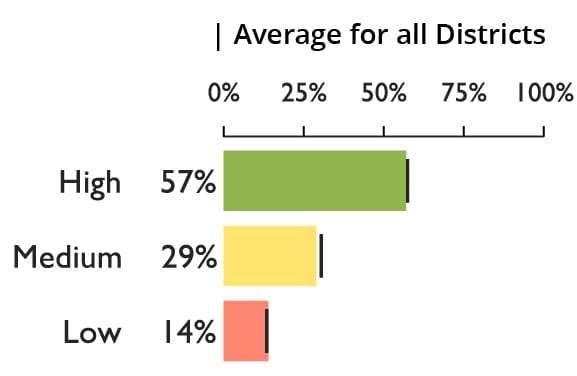
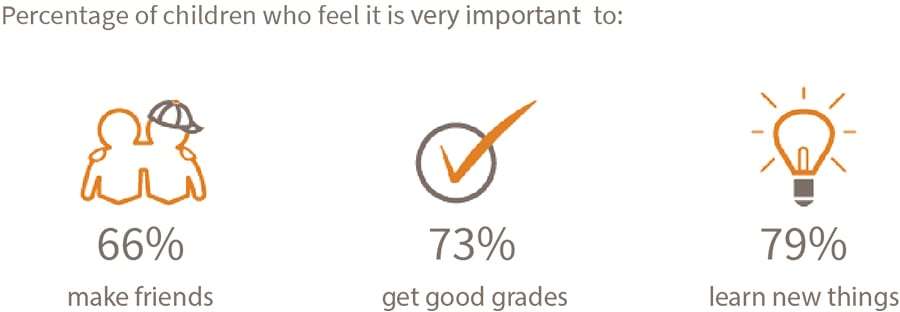
In addition to bar graphs, data are also displayed using infographics and data tables designed to support a comprehensive exploration of MDI data.

Understanding and reflecting on MDI data presented in the MDI Reports can catalyze action to support children’s assets and well-being. For some questions to consider as you examine MDI Reports, visit the Exploring MDI Data page. For ideas on how these data can be used as part of your efforts to make positive change in your community, visit the Making Change page.

